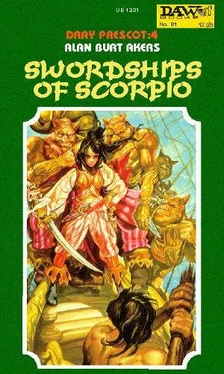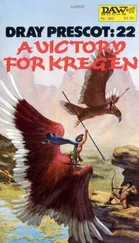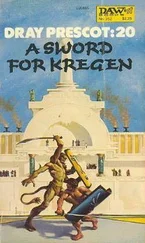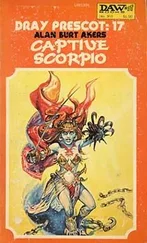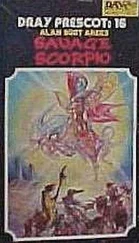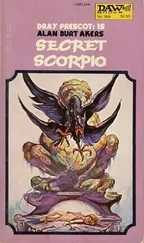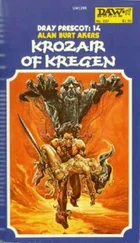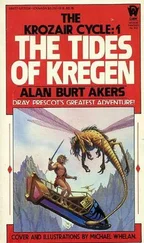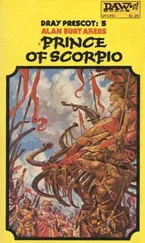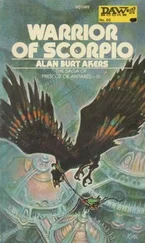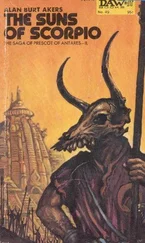Alan Akers - Swordships of Scorpio
Здесь есть возможность читать онлайн «Alan Akers - Swordships of Scorpio» весь текст электронной книги совершенно бесплатно (целиком полную версию без сокращений). В некоторых случаях можно слушать аудио, скачать через торрент в формате fb2 и присутствует краткое содержание. Жанр: Героическая фантастика, на английском языке. Описание произведения, (предисловие) а так же отзывы посетителей доступны на портале библиотеки ЛибКат.
- Название:Swordships of Scorpio
- Автор:
- Жанр:
- Год:неизвестен
- ISBN:нет данных
- Рейтинг книги:5 / 5. Голосов: 1
-
Избранное:Добавить в избранное
- Отзывы:
-
Ваша оценка:
- 100
- 1
- 2
- 3
- 4
- 5
Swordships of Scorpio: краткое содержание, описание и аннотация
Предлагаем к чтению аннотацию, описание, краткое содержание или предисловие (зависит от того, что написал сам автор книги «Swordships of Scorpio»). Если вы не нашли необходимую информацию о книге — напишите в комментариях, мы постараемся отыскать её.
Swordships of Scorpio — читать онлайн бесплатно полную книгу (весь текст) целиком
Ниже представлен текст книги, разбитый по страницам. Система сохранения места последней прочитанной страницы, позволяет с удобством читать онлайн бесплатно книгу «Swordships of Scorpio», без необходимости каждый раз заново искать на чём Вы остановились. Поставьте закладку, и сможете в любой момент перейти на страницу, на которой закончили чтение.
Интервал:
Закладка:
Her ivory skin gleamed against the silk. Her black hair swirled as she walked. She prowled like a caged leem, like one of those leem stalking in the leem pit below the palace of the Esztercari in far Zenicce when my Delia clung in the cage above their ferocious fangs and claws.
“You need not whisper, Dray. Pando is fast asleep and it will take the wrath of the invisible twins to wake him. I sent him up to bed after — I saw that.” Her voluptuous lips tightened. “I saw that, and I made up my mind.”
I said, “What kind of life can he have, out here, on the frontier, Tilda?”
She clenched and unclenched her hands. She padded up and down those carpets of Walfarg weave, up and down.
“Old Nath runs a respectable house, for Pa Mejab. Yet already you have seen what can happen, Tilda.”
I tried to make my face smile for her; but I gave that up, and said flatly and, I fear, brutally: “You must take him home and claim what is his right.”
Her white hand flew to her throat. She halted, stricken, and gazed at me, those violet eyes enormous in her white face.
“What? You know — how can you know?”
“It is not difficult, Tilda. By Zim-Zair. His father must have been a man!”
“He was! Oh, yes, he was! Marker Marsilus! Who would have been Kov of Bormark this day, had he not died out here in this pestiferous hell-hole. And Pando is his son.”
“You mean, Tilda, that your son Pando is really Pando Marsilus, Kov of Bormark. He is, rightfully and legally. Is this not so?”
She looked at me, still and alert, like a risslaca watching a bird. “He is, Dray Prescot. Rightfully and legally.” She took a breath so that the green gown moved and slithered. What she said next rocked me back with surprise.
“I am going home to Tomboram and I am going to claim what is his right for Pando. Dray Prescot -
will you come with me and help Pando and me? Will you be our champion?”
CHAPTER NINE
Ochs, Rapas, and Fristles do not make good seamen. Chuliks may be trained, given the methods to which I had been born and grown accustomed, the system of the late eighteenth century, consisting of the lash, the starters of the bosun’s mates, a wall of marines — and the lash. Rum, in its counterfeit of shipboard wine, also helped.
As a consequence the vast majority of the crew of Dram Constant, Captain Alkers, were men of recognizable Homo sapiens stock. The few halflings were, and on their own wishes, employed in noncritical functions aboard ship — waisters.
No captain in his right mind would enroll a Fristle. I saw one being aboard — he was not Homo sapiens
— who interested me mightily. His body was square in the sense that the distance across his shoulders, waist, and hips was the same, and equaled the distance from his neck to his upper thigh. He had but two arms, and they were as long and thin as Inch’s, while his legs, also long, were nearly as thick as Inch’s, which is another way of saying he was spindly-legged in the extreme. His face bore a cheerful rubicund smile at all times, his ears stuck out, he had a snub nose, and he could run up the ratlines and around by the futtock shrouds into the top with the agility of a monkey. This man, one Tolly, was a member of the race of Hobolings, inhabiting a chain of islands that I have mentioned, that ran parallel to the northeastern coast of Loh from the tip of Erthyrdrin southeastward to the northwest corner of Pandahem opposite the land of Walfarg.
Dram Constant, as Captain Alkers was happy to tell me, was as fine and tight an argenter as it was possible to find plowing the Sunset Sea. He knew that this report of his ship had been the cause of our taking passage in her, our little party consisting of Tilda and Pando, and Inch and I as guards and champions to protect them and see they were not molested and reached their destination safely. I believe it is not necessary to dwell on the mental turmoil I went through after Tilda’s offer. As the days passed and the dwaburs slipped past our keel, as we sailed in the armada toward Loh, I had again and again to rationalize out my decision. Delia of Delphond waited for me in Vallia; yet I was to travel to Pandahem. Not only was I sailing away from her, I was voyaging to a land in deadly rivalry with her own. By taking an intense interest in every aspect of the argenter — an occupation easy to feign — I canceled out a great deal of my own misery and indecision. I thought Delia would understand, I prayed she would; and yet I doubted. .
This argenter was about a hundred and thirty feet long — Captain Alkers told me she was a hundred feet on the keel — and almost fifty feet on the beam. She was thus little more than twice as long as she was broad. Captain Alkers also said she was eight hundred and fifty tons burdened; but this I tended to doubt. She was a fat, wallowy, comfortable ship, with good stowage place below. We quartered ourselves aft, within the three-decked aftercastle, and our cabins were of a roominess that at first amazed me, used to far more cramped quarters. One genuine improvement these sailors of the outer oceans had made in their ships over the swifters of the inner sea was in the use of a rudder and whipstaff in place of the twin steering oars.
With her three masts and her square sails, Dram Constant plunged gallantly onward, sheeting spray, and if she made a great deal of fuss about her passage she did make a passage over open and truly deep sea
— if at a snail’s rate of knots.
Pando loved to lie out along the bowsprit beneath the spritsail mast and watch the water smashing against the round cheeks of the bows, creaming and coiling away. Dram Constant, as it were, squashed her way through the sea.
Tilda was continuously on at Pando, and me, for the lad to come down where it was safe. After I showed him a few of the necessary tricks of the trade any sailorman must have, I felt a little more confident about him. But, all during that passage, he was a sore trial. Probably in an attempt to get his mind off ships and to confine him to one spot, Tilda got me to teach him rapier and dagger work. In truth, he was of an age when this very necessary accomplishment would be vital for him to learn quickly.
A full-size Jiktar and Hikdar would have overweighted him, but we were fortunate in being able to borrow a practice pair belonging to one of the young gentlemen signed aboard Dram Constant to learn their trade. With these I had Pando puffing and lunging, riposting, parrying, drawing the main-gauche back in cunning feints, carrying out all the many evolutions of swordplay — the twin-thrust, the heart-thrust, the thigh stop, the flower, the neck riposte — until he was dripping with sweat and limp as a moonflower on a moonless night. Tilda would sometimes watch, and when the boy flagged, would say tartly: “Get on, Pando, get on! This is man’s work now! Stick him!”
She did not, and for this I was mightily thankful, use that expression: “Jikai!”
Tilda and Pando proved excellent sailors.
Poor Inch lost a great deal of his dinner and his dignity over the side. Memories ghosted up — to be instantly quelled.
For me to be back on the sea again was an invigorating experience, and I snuffed the sea breeze like an old hunter let out to the chase once more. The sky gleamed and glowed above us, a few clouds streamed in the wind, the breeze bore us on, all our flags and banners snapped and whistled in that breeze, our canvas strained, billowing with all the painted panoply gorgeous upon it. We plunged and reared in the sea and in our wake we left a broad swathing wash of creamy foam. Yes, for a time they were good days. I knew that I would reach my Delia; first I had to deliver Tilda and Pando — that imp of Sicce who was now Kov of Bormark — safely to Tomboram.
Читать дальшеИнтервал:
Закладка:
Похожие книги на «Swordships of Scorpio»
Представляем Вашему вниманию похожие книги на «Swordships of Scorpio» списком для выбора. Мы отобрали схожую по названию и смыслу литературу в надежде предоставить читателям больше вариантов отыскать новые, интересные, ещё непрочитанные произведения.
Обсуждение, отзывы о книге «Swordships of Scorpio» и просто собственные мнения читателей. Оставьте ваши комментарии, напишите, что Вы думаете о произведении, его смысле или главных героях. Укажите что конкретно понравилось, а что нет, и почему Вы так считаете.
